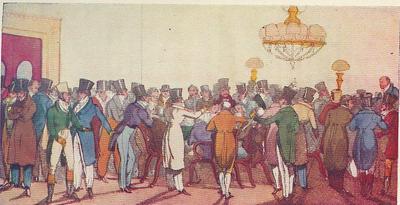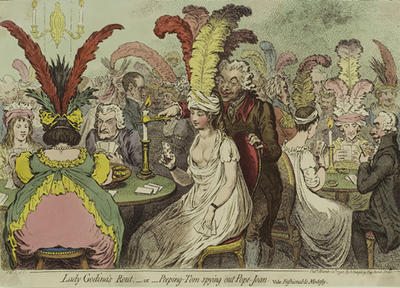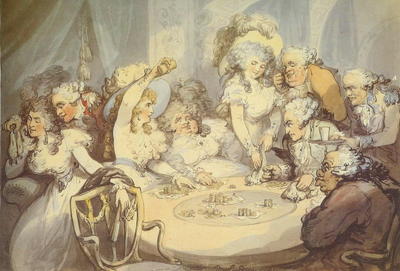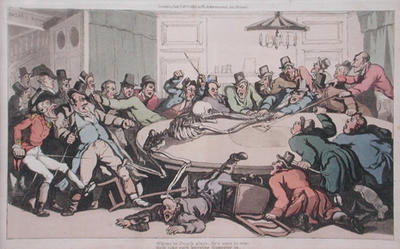Ah . . . Regency gambling. Dice, horse races, and most of all — card playing. What’s not to love?
For both writers and readers, gambling scenes hold the promise that anything can happen. Fortunes (and brides) won or lost on the turn of a card . . . men arrested for playing illegal games like hazard or faro . . . duels that originate with allegations of cheating . . . ladies who lose their reputations for gambling too deeply, or for visiting a gaming hell . . .
Even the games have fabulous names: bizarre names like piquet, loo, basset, E-O, Pope Joan, vingt-un, cassino, quadrille, lansquenet, faro; names that hint at what goes on in the game, like commerce and speculation; and a few games that are still played today under the same names, like whist and cribbage.
Authors: have you used card games (or other forms of gambling) in your novels? What challenges did you face in doing so? Did you find yourself writing less or more detail about the actual gambling than you originally intended?
Everybody: which are your favorite gambling or card-playing scenes in Regency-set fiction? Which works do you think succeed best in this area? Or are there scenes in Regency-set films or television which you think have great gambling scenes?
Have you ever played Regency card or dice games? Which ones? Did you love them . . . hate them . . . become desperately addicted, and lose the family estate . . . or find yourself eating your chocolate coins instead? 🙂
Cara
Cara King — www.caraking.com
MY LADY GAMESTER — Signet Regency, November 2005





Cara:
I fervently admire anyone who can figure out those card games. I tried, once, when I was toying with the idea of A Singular Lady being called Worthy Gamble, but gave it up when I realized I was just too stupid. I love card games in scenes, though, and love the tension inherent in the game being played out across the pages. Makes for great flirtation.
Completely off-topic, my ex-boyfriend was a professional bridge player. I never, ever understood any of that stuff. But I’ll read about it in Regencies any day.
Thanks, Cara!
Heck, NON-professional bridge players scare me! They’re so good at counting cards! I’m more of a casual player.
My heroine, of course, is a much better card-player than I. Oh, the joys of writing fiction. 🙂
Cara
Answering my own post . . .
The most memorable card-playing scenes I’ve read are in Georgette Heyer’s FARO’S DAUGHTER. (No surprise there!) And they play my favorite game, piquet! There’s also some very entertaining card playing in Jane Austen’s MANSFIELD PARK, believe it or not!
As for playing the games — I do. I particularly like piquet and cassino. I’m not as interested in the games which were pure luck, such as faro and macao — which I think are only tolerable if one is actually gambling, and for me, not much even then.
And of course I have card playing in my novel! Lots of piquet, plus whist and cassino, and references to other games (such as macao — which I forgot to mention before!)
Cara
FARO’S DAUGHTER is one of my very favorite Heyer novels–both for the gaming, and for the very, er, combative relationship between the hero and heroine. I’ve also enjoyed gaming scenes in quite a few other Regencies, though I’m having a hard time coming up with titles off the top of my head. 🙂 One I read recently, though the book is not recent, is THE DEVIL’S BRIDE by Penelope Stratton, where in an early scene the hero seemingly cold-bloodedly strips a man of his last pound and the deed to his house in a card game.
Another scene that sticks in my mind–though unfortunately, not in a good way–is when the heroine in Metzger’s AN AFFAIR OF INTEREST is forced to be the bank in a game of Faro, and the hero comes to her rescue by standing behind her and telling her which cards to play. Anyone who has ever played Faro, or read the rules, knows that the bank has absolutely no choice about which card to play. But even the great can nod from time to time. I do love Metzger’s books in general (and even like that one, though it has more historical inaccuracies than most).
In films, there is a card party at the end of PERSUASION; but the film I’ve seen that really depicts serious gambling is BARRY LYNDON. The period is earlier–18th century rather than Regency–but it has the right feel. (The film also has a couple of very realistic duels, in which you can see that the characters are actually afraid of being killed.)
I have played quite a few Regency-era card games from time to time, though the ones I’ve played most are Piquet, Whist, Cassino, Pope Joan, and Loo. I’ve only played Faro once–it calls for rather specialized equipment.
And I hear great things about this forthcoming novel, MY LADY GAMESTER. I can hardly wait until it comes out!
Todd-whose-entire-fortune-rests-on-the-turn-of-a-card-but-unfortunately-that’s-not-saying-much
I’m not especially good at cards. When I was a kid my parents used to keep me up at night to play pinochle (sp?) with my grandfather, and what I really remember is just being too SLEEPY to enjoy it. I think I might like card games more now, though I don’t have much opportunity to play.
Like Cara, games of pure chance never excited me. I played slot machines just once in my life and felt like I was at a candy machine that ate my money….
Anyway, I’ve hesitated to do anything with gaming in my own books. Doesn’t mean it won’t happen, it wouldn’t be the first time I had to go learn something new for a story!
Of course the risk-taking inherent in gambling lends itself to interesting conflicts. I loved FARO’S DAUGHTER, too, also the gambling scenes in THE MASQUERADERS (even though that’s not a Regency).
Elena
I haven’t played any or seen any in movies or tv that I recall, but the last book that I remember reading that was really big with gambling (unfortunately can’t remember the title) but the heroine’s gambling to raise money for herself, meets the hero who helps her and of course, live happily ever after. 🙂 I guess my details rather suck, but I read a lot, and if it’s been a while, I do tend to forget. LOL I probably need to make a better reading log for myself. 🙂
I know what you mean about keeping a reading log, Lois! I broke down a few years ago and started listing all the books I read (as well as plays read & seen, and movies) but if I were really clever I’d write my reaction to each book! Then I wouldn’t be left with a vague “Okay, I know I read it, but did I enjoy it?” 🙂
Cara
Oh, I remember that Barry Lyndon movie! Haven’t seen it in ages, but I thought it evoked the era so well. As for card games–I’m just not good at them. I enjoy trying to learn, and I’m in awe of anyone who is great at it (like Cara), but I just always lose. So I’m one of the ones who ends up eating her chocolate coins at the soiree. :))
I don’t remember very many gambling scenes in books, but there was one romance I read a very long time ago. Not a Regency, maybe a Western? Anyway, can’t remember the title or author or anything else about the plot, but it had a great strip poker scene between the hero and heroine that was funny and sexy. How is that for an unhelpful comment? :))
Oh, I sooooo know that feeling! I’ve noticed the most at times I’ll put is a “very cool”, so when I look back at it, I realize I really liked it, but doesn’t tell me much. . . LOL And then of course, if I didn’t like one, I really have no idea why. Well, maybe next year with a new year, I can change it a bit to try to fix that — I already have it set for the rest of the year! LOL 🙂
A card game is any game using playing cards as the primary device with which the game is played, be they traditional or game-specific. Countless card games exist, including families of related games (such as poker). A small number of card games played with traditional decks have formally standardized rules, but most are folk games whose rules vary by region, culture, and person.’
Most interesting write-up on our blog site
<http://www.caramoan.co